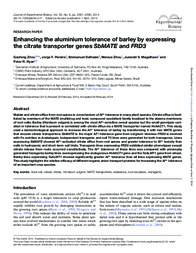Enhancing the aluminium tolerance of barley by expressing the citrate transporter genes SbMATE and FRD3.
Enhancing the aluminium tolerance of barley by expressing the citrate transporter genes SbMATE and FRD3.
Author(s): ZHOU, G.; PEREIRA, J. F.; DELHAIZE, E.; ZHOU, M.; MAGALHAES, J. V.; RYAN, P. R.
Summary: Malate and citrate efflux from root apices is a mechanism of Al3+ tolerance in many plant species. Citrate efflux is facilitated by members of the MATE (multidrug and toxic compound exudation) family localized to the plasma membrane of root cells. Barley (Hordeum vulgare) is among the most Al3+-sensitive cereal species but the small genotypic variation in tolerance that is present is correlated with citrate efflux via a MATE transporter named HvAACT1. This study used a biotechnological approach to increase the Al3+ tolerance of barley by transforming it with two MATE genes that encode citrate transporters: SbMATE is the major Al3+-tolerance gene from sorghum whereas FRD3 is involved with Fe nutrition in Arabidopsis. Independent transgenic and null T3 lines were generated for both transgenes. Lines expressing SbMATE showed Al3+-activated citrate efflux from root apices and greater tolerance to Al3+ toxicity than nulls in hydroponic and short-term soil trials. Transgenic lines expressing FRD3 exhibited similar phenotypes except citrate release from roots occurred constitutively. The Al3+ tolerance of these lines was compared with previously generated transgenic barley lines overexpressing the endogenous HvAACT1 gene and the TaALMT1 gene from wheat. Barley lines expressing TaALMT1 showed significantly greater Al3+ tolerance than all lines expressing MATE genes. This study highlights the relative efficacy of different organic anion transport proteins for increasing the Al3+ tolerance of an important crop species.
Publication year: 2014
Types of publication: Journal article
Unit: Embrapa Wheat
Keywords: Cevada, Citrato, Solo Ácido, Tolerância ao alumínio, Transgênico
Observation
Some of Embrapa's publications are published as ePub files. To read them, use or download one of the following free software options to your computer or mobile device. Android: Google Play Books; IOS: iBooks; Windows and Linux: Calibre.
Access other publications
Access the Agricultural Research Database (BDPA) to consult Embrapa's full library collection and records.
Visit Embrapa Bookstore to purchase books and other publications sold by Embrapa.

